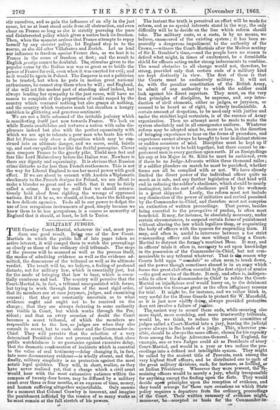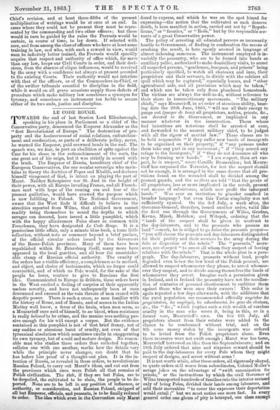MILITARY J1TDGES. •
THE Crawley Court-Martial, whatever its'end, must pro- duce one good result. Beilig one of the few Court- Martials in which the public hff of' late yes taken an active interest, it will compel them to watch the procegdings as closely as those of the ordinary civil tribunals. The steps of the process will be scanned as well as the process itself, the modes of admitting evidence as well as the evidence ad- mitted, the demeanour of the tribunal as well as its ultimate verdict. The result will be, we believe, a feeling of profound distaste, not for military law, which is essentially just, but for the mode of bringing that law to bear, which is essen- tially cumbrous and bad. The country will perceive that the Court-Martial,is, in fact, a tribunal unacquainted with former, but trying to work through forms of the most rigid order, that its members are at once jurymen, judges, and examining counsel ; that they are constantly uncertain as to what evidence ought and ought not to be received on the charge ;- that they are always deferring to some authority not visible in Court, but which works through the Pre; sident ; and that on every occasion of doubt the Court becomes a secret tribunal, of which the members are responsible not to the law, as judges are when they also consult in secret, but to each other and the Commander-in- Chief. They will perceive that the selection of a very determined President does not prevent confusion, that. close public watchfulness is no guarantee against excessive delay, that the dramatic condensation of incidents which is essential to the value of oral testimony—delay changing it, in fact, into mere documentary evidence—is wholly absent, and that, finally, military simplicity is no protection against the most astute legal quibbles. They will, in short, realize, as they have never realized yet, that a charge which a civil court would, hear with the most exhaustive patience within the compass of twenty-four hours, may be diffused by a 'military court over three or four months, at an expense of time, money, and human suffering altogether unjustifiable. Only assume
for a moment that Colonel Crawley is innocent, and e the punishment inflicted by the tension of so many wees as he must remain at the full stretch of his powers.
The instant the truth is perceived an effort will be made for reform and as no special interests stand in the way, the only difficulty will be to decide on the line which reform should take. The military caste, as a caste, is by no means, we believe enamoured of the existing system ; it has been re- peatedly y a dangerous impediment to the authority of the Crown,—witness the Court-Martials after the Madras mutiny of Sir E. Gambier's time,—and the people have no reason to defend what might, in times of excitement, be a formidable shield for officers acting under strong inducements to combine. The usual obstacles to all change would not, therefore be- strong, provided only that certain ends of a military hind are kept distinctly in view. The first of these is that the Courts must be exclusively military. It will not do, with the peculiar constitution *of the British Army, to admit of any authority to which the soldier could look against his direct superiors. They. must, on the very first principles of discipline be supreme, and an3s intro- duction of civil elements, either as judges, or jurymen, or counsel to be heard as of right, is utterly inadmissible. A. certain amount of despotism, to be used only with jugtiee and under the strictest legal restraints, is of the essence of Army organization. Then no attempt must be made to make the system absolutely and in all emergencies uniform. Whatever reform may be adopted niust be, more or less, in the direction of bringing experience to bear on the forms of procedure, and cannot always be brought to bear in distant stations or sudden occasions of trial. Discipline must be kept up if only a company is to be held together, but there cannot be ex- Terienced men in every garrison upon earth. If an Ensignflings- his cap at his Major in St. Kitts he must be cashiered, even, if there be no Judge-Advocate within three thousand miles; if a soldier plunders on march he must be punished, whether forms can all be complied with or not. We have already limited the direct power of the individual officer quite -as much as is safe, and any further legislation of that kind will end in reducing the soldier's obedience, which should be nearly instinctive; into the sort of obedience paid by the workmen in a great shipyard. Lastly, the reform must not include any diminution of the power of initiative and revisal possessed by the Commander-in-Chief, and therefore must not comprise an extinction of written proceedings. That power, besides, being essential to the prerogative of pardon is often most beneficial. It may, for instance, be absolutely necessary, under certain circumstances, to suspend certain forms of punishment without altering the law which legalizes thew, or acquainting the body of officers with the rpasons for suspending them. It may, and often is, useful to intervene between a too strict commanding officer and the men without telling a Court- Martial to distrust the form's martinet 'Meas. It may, and in officers' trials it often is, necespary to act upon knowledge in the possession of the Commander-in-Chief, but not com- municable to any tribunal whatevei. That is *a reason why Courts held up,en " scandals" so often seem to break down, and the power though sometimes abused is in an army which forms tine great club Often essential tothe first object of armies —the good service of the State. It may, and often is, indispen- sable to allow the Rommander-in-Chief to refirse the Court- Martial an injudicious zeal 'would' hurry on, to the detriment of interests ten times.as great as the often iiffkginary reasons for trial.. It might be, for instance, and we rather think is, very useful for the Horse Guards to protect Sir W. Mansfield, as it is just now visibly doing, always provided proteetion does not involve a failure of justice.
The.easiest way to secure these ends, while securing also more rapid, more searching, and more trustworthy tribunals, would be, we think, to reduce the present committee of judges called a Court-Martial into a jury, leaving the judicial power always in-the hands of a judge. Thist wherever pas- sible, should be always the same officer, chosen for his capacity from among the Judge Advocates-General. In 'Englancl, for example, one or two Judges could sit as Presidents of evert- Court-Martial, and would in a year or two reduce the pro- ceedings into a defined and intelligible system. They might be called by the ancient title of Provosts rank among the very highest Staff officers, and be distributed one to each of the great military divisions such, for instance, as Irernd or an Indian Pfesidency. Wherever they were present, thFlre- medning officers would be merely a jury, wholly irresponsible* for anything except the finding upon the facts. They would decide uper principles upon the reception of evidence, and they bould arrange for-those rare -occasions on which State policy requires a departure from the ordinary, proceedings of the Court. Their written summary of evilence might, moreover, be—accepted as basis for the Commander-in- Chiefs revision, and at least three-fifths of the present multiplication of writings would be at once at an end. In cases where they could not be present they must be repre- sented by the commanding and two other officers ; but these would in turn be guided by the rules the Provosts would be certain, in course of time, to lay down. . If selected with care, and from among the class of officers who have at least some training in law, and who, with such a reward in view, would soon be infinitely better trained, the Provosts would speedily acquire that respect and authority of office which, far mo-e than any law, keeps our Civil Courts in order, and their deci- sions, from the absence of clique influences, would be received by the army with a confidence not always at present accorded to the existing Courts. Their authority would not interfere with that of the officers, or of the Commanders-in-Chief, or of the swifter tribunals essential to discipline in the field, while it would on all grave occasions supply those defects of procedure which make military law sometimes a synonym for tyranny, and sometimes an instrument too feeble to secure either of its two ends, justice and discipline.































 Previous page
Previous page